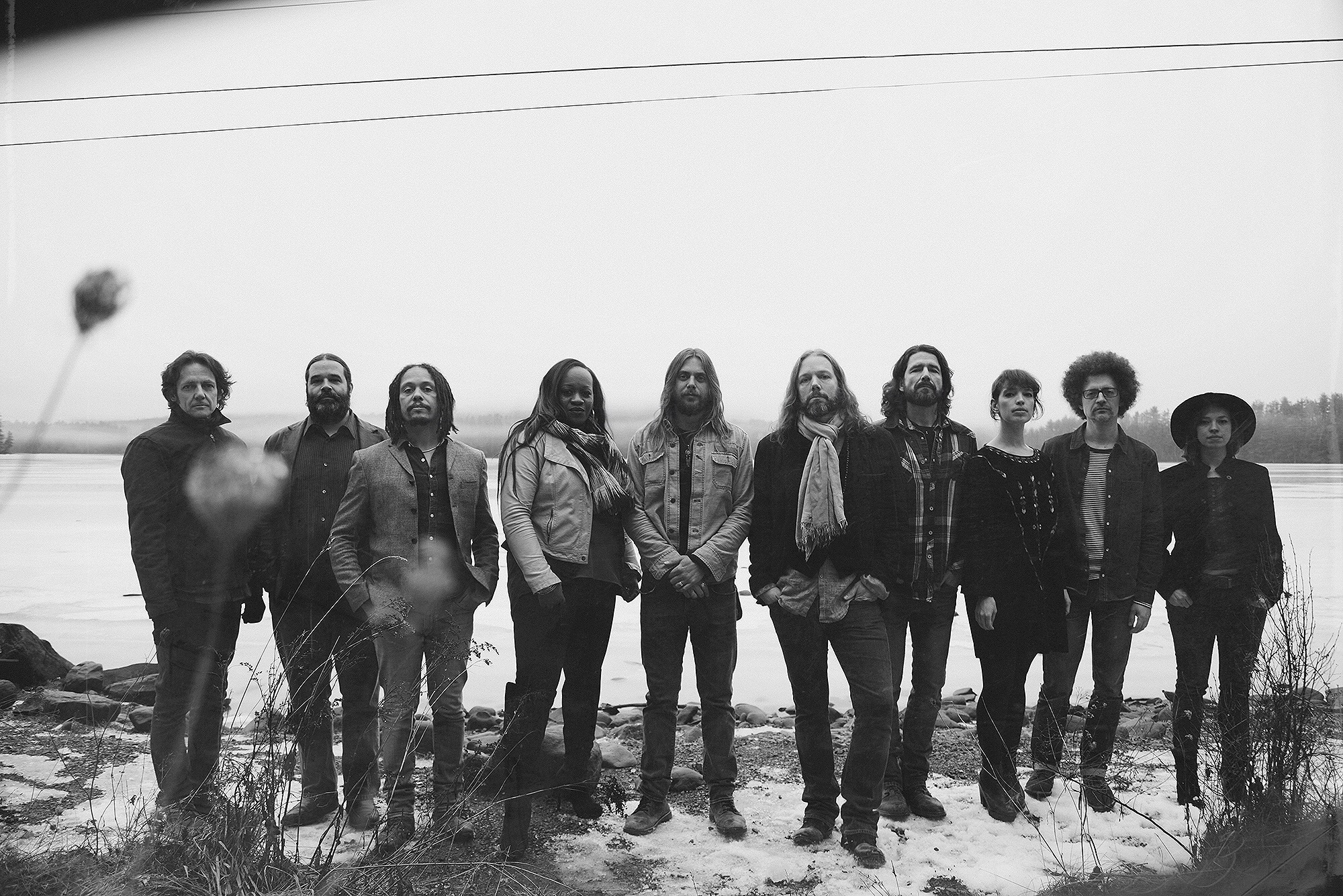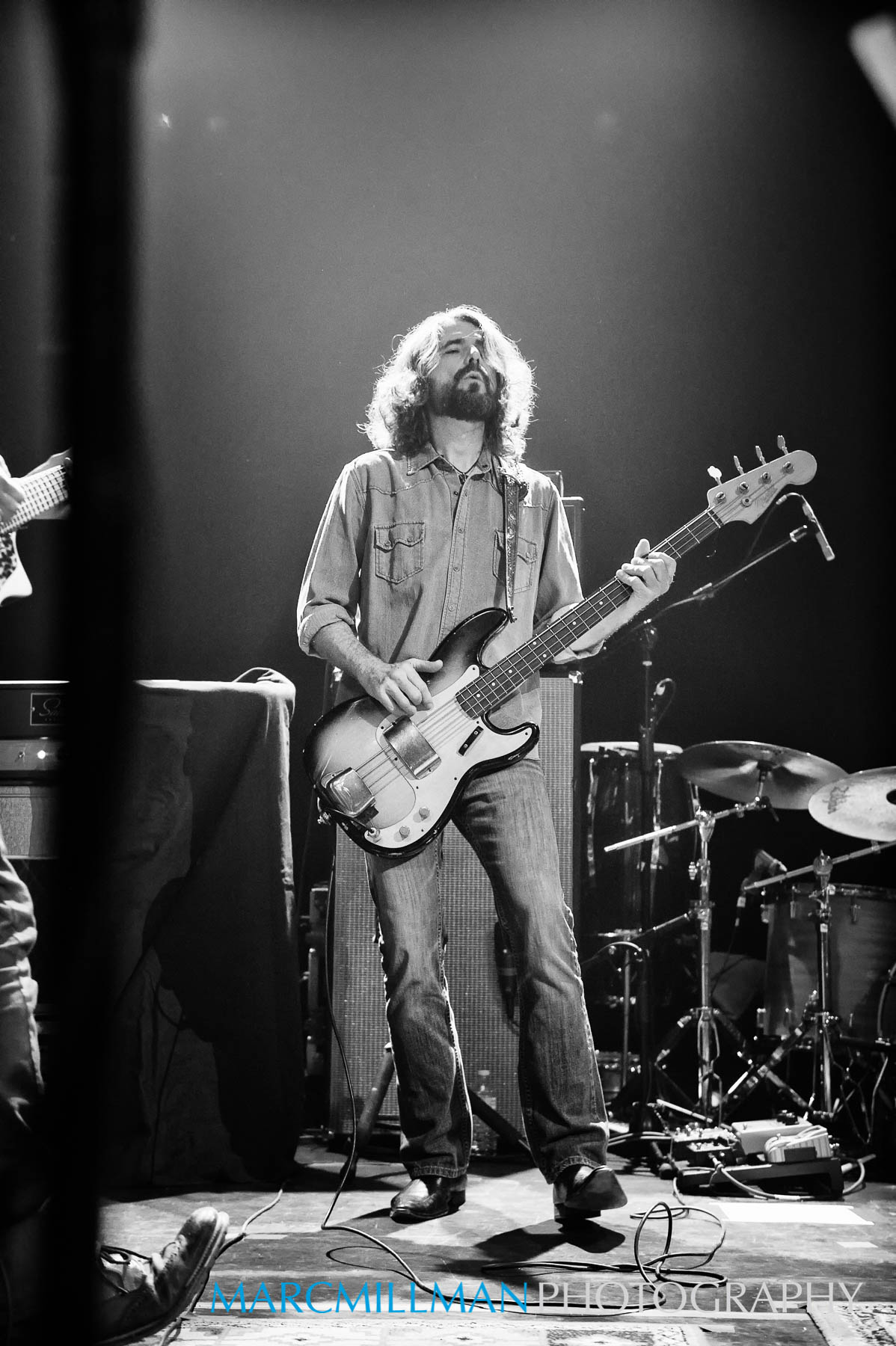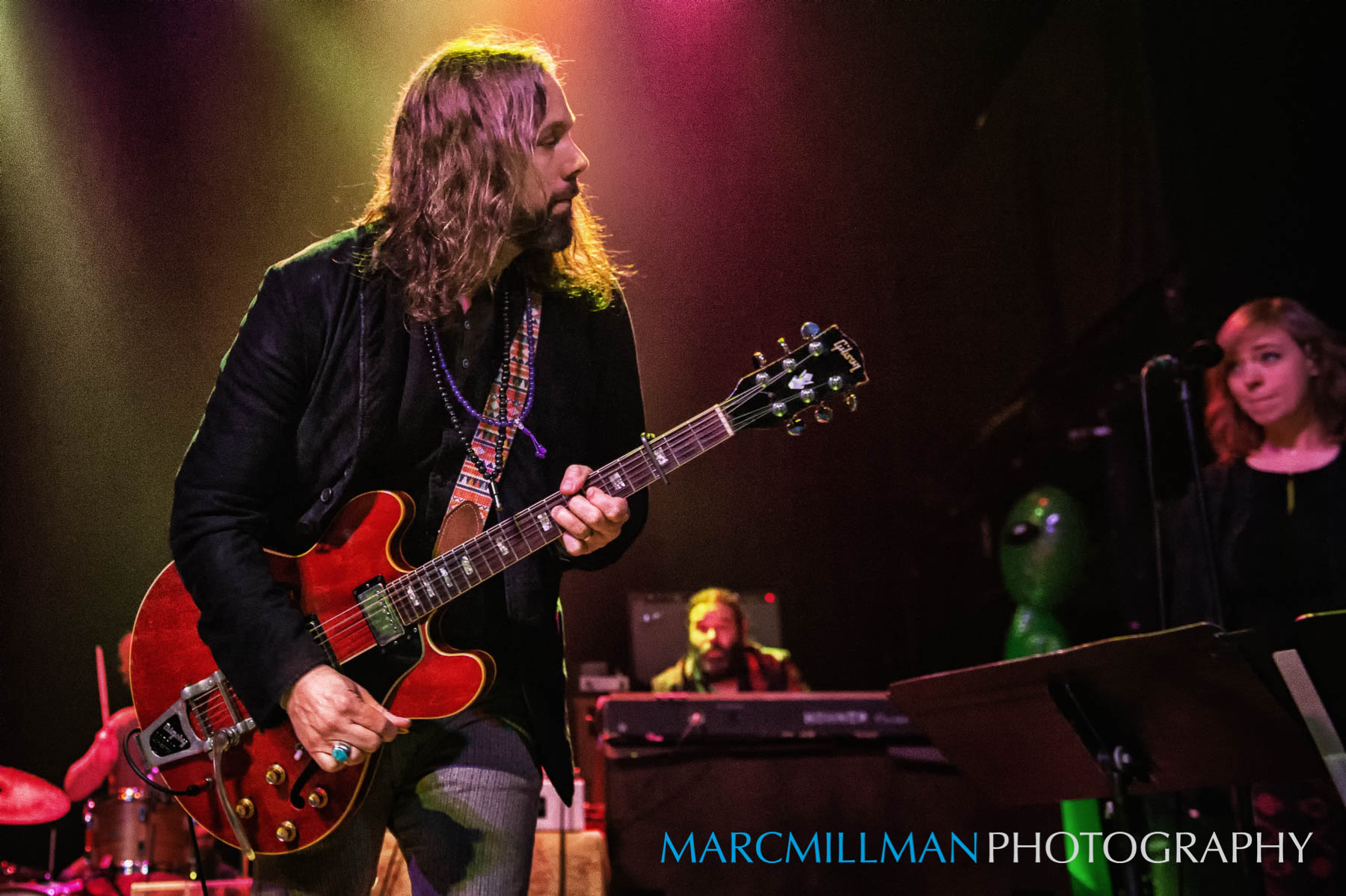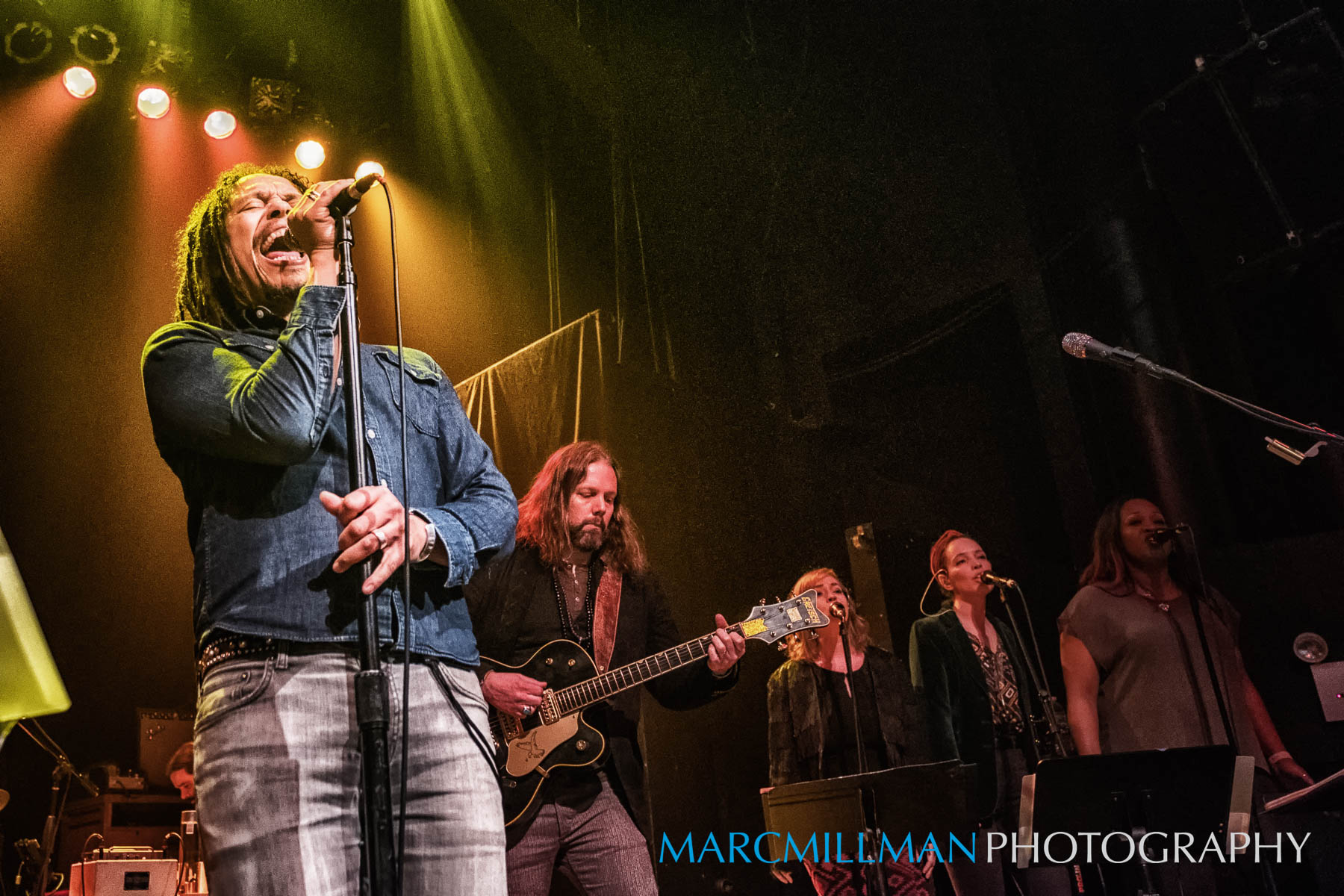The Magpie Salute: A Collective of Souls

They were born in a crossfire hurricane.
Well, not really, but you could say that Superstorm Sandy did have a hand in watering the roots of the musical collective that eventually came to be known as The Magpie Salute back in October of 2012.
The New York warehouse where The Black Crowes stored their gear was one of the many devastated Northeast buildings that Sandy left behind. Much of guitarist Rich Robinson’s prized collection of amps and guitars was damaged or destroyed by the storm’s surge; a few instruments floated to safety and were used in the recording of Rich’s solo album The Ceaseless Sight. And a handful of the surviving guitars belonged to his former bandmate, Marc Ford.
Ford, a California-based picker brought on board by The Black Crowes in 1991, first gained mainstream attention when his guitar blasted clear of the mix at the 3:01 mark of “Sting Me”—the opening cut of the Crowes’ 1992 release, The Southern Harmony and Musical Companion. For many, the interplay between Rich and Ford during the following years is the mark of the ultimate Crowes guitar lineup, both in the studio and live.
However, Ford parted ways with the band in 1997—struggling with a drug addiction that eventually landed him in an intensive care unit. “I’d hit rock bottom,” says Ford, “and realizing that forced me to take an inventory: ‘What’s going on here?’ It was a difficult situation, but it forced me to do something else.”
Embracing a newfound faith and sobriety, Ford woodshedded, bringing his talents back to life. He lent his services to Ben Harper, Blue Floyd, Booker T. Jones, Gov’t Mule and, in 2005, he rejoined The Black Crowes when Rich and his brother, lead singer Chris Robinson, reformed the group after a three-year hiatus. 
Ford’s second term as a Crowe produced more great music (documented on their Freak ‘n’ Roll…Into the Fog live release) but the reunion only lasted until the fall of 2006, when he resigned, feeling that his sobriety would be in jeopardy if he continued with the band.
Regardless of how things had gone down between Ford and the Crowes, Rich still had positive feelings about the music they had made together.
“When it comes to people who get what you’re doing musically,” Rich says while calling from his home, “Marc was someone I enjoyed playing with. When we played together, it was like having a conversation on a whole different level. To have a musical relationship like that is a gift, you know?”
Fast-forward to the guitars salvaged from the Crowes’ flooded warehouse in late 2012. The survivors included an Asher electric (the prototype of what would become the Marc Ford Signature model), a lap steel and a 12-string acoustic. When Rich moved his family from the East Coast to Los Angeles soon after, his gear went with him—along with Ford’s guitars.
Rich returned the salvaged guitars to Ford through guitarist Dan Wistrom, a mutual friend who was playing in the younger Robinson’s solo band. And when the Robinsons’ father passed away later that year, Ford contacted Rich with his condolences.
“We both reached out to one another at different times in really simplistic, cool ways,” says Rich.
When you talk to Rich Robinson, it’s easy to forget the turmoil and conflict that seemed to go hand in hand with the great music that The Black Crowes created over the years.
Rich’s voice is peaceful, and his 14-month-old son can be heard over the phone at times—soft coos and burbles as he hangs out in his daddy’s arms.
It’s certainly a different vibe than the one surrounding the implosion of the Crowes when they officially disbanded in January of 2015. It isn’t a secret that the stability of the Crowes over their history was based on the relationship of the Robinson brothers, and a disagreement over business arrangements—according to a statement released by Rich, Chris was pressing for a controlling share of the band— dealt the final blow.
For Rich, the official end of the Crowes provided a certain amount of clarity: He was able to focus on his solo recordings and band. (The Black Crowes’ last performance was in December of 2013; they planned to regroup for a tour in 2015 before discussions went south.)
By the time he was ready to tour behind his 2016 solo album, Flux, Rich had built a formidable ensemble featuring keyboardist Matt Slocum, former Crowes bassist Sven Pipien, guitarist Nico Bereciartua and longtime collaborator and latter-day Crowes contributor Joe Magistro on drums.
In August 2016, Rich booked a key stop at Applehead Recording in Saugerties, N.Y.— the site of his 2014 Woodstock Sessions album, which was recorded before a live studio audience. He scheduled three days of music, with two sessions each day, and began thinking about adding some special guests.
“I wanted Marc there for the same reason that I talked about before: We get what each other is doing and it sounds great, and we’re big fans of one another,” he says.
Ford, meanwhile, was in the process of putting together a tour with his buddies in The Neptune Blues Club behind a brand new album, The Vulture.
His reply when Rich asked him to join in on the Woodstock weekend was simple: “Yeah, let’s do this.”
 Rich wasn’t done recruiting though: His next call was to Eddie Harsch, who’d served as the Crowes’ keyboardist from 1991 to 2006, at which time he was fired for “personal reasons,” according to an official statement. Rich, however, had maintained contact with Eddie since his departure. “I’d call him a couple times a year to check on him and make sure he was OK,” he says. “I’d try to get him to play on my records or come out on tour, but he wasn’t in the right headspace for that. But when I told him: ‘Marc’s coming to Woodstock and I want you to come down,’ Eddie was like, ‘I’m there.’”
Rich wasn’t done recruiting though: His next call was to Eddie Harsch, who’d served as the Crowes’ keyboardist from 1991 to 2006, at which time he was fired for “personal reasons,” according to an official statement. Rich, however, had maintained contact with Eddie since his departure. “I’d call him a couple times a year to check on him and make sure he was OK,” he says. “I’d try to get him to play on my records or come out on tour, but he wasn’t in the right headspace for that. But when I told him: ‘Marc’s coming to Woodstock and I want you to come down,’ Eddie was like, ‘I’m there.’”
They added background singers Adrien Reju and Katrine Ottosen to the lineup for the three-day run and arrived armed with setlists that combined a mix of songs from Rich’s solo albums, the Crowes’ catalog and some classic covers.
“Having the four of us— Marc, Ed, Sven and me—all in the same room and playing music together was so much fun,” says Rich. “And Ed got to be around fans that hadn’t seen him for a while. It was great.”
Originally, there weren’t any plans for the “Rich Robinson & Friends” lineup beyond Woodstock, but the feelings in the room were too strong to deny.
Rich admits, “I started thinking: ‘I love the guys in the band I’m in now, and I love all these people, too. Why can’t we all just get together and make music? How would we do this? What would it be like?’”
Rich, who was already touring behind the Flux album with Magistro, Slocum, Bereciartua and Pipien, reached out to his former guitarist while on the road. Ford wasn’t surprised to get the call. “I never believed that we were finished. There was the relationship between Rich and me that was there before the Woodstock sessions and will be there until long after we’re gone,” he says.
“I knew, deep down, ‘this isn’t over—it’s a force of its own. When we’re worthy of it, we can go back to it.’”
The Woodstock players agreed to keep the momentum going, and Rich added two additional voices: John Hogg, a powerful singer who had worked with Rich years earlier in the short-lived Hookah Brown project, and Charity White, who joined the soul and gospel-flavored mini-choir of Reju and Ottosen.
The band officially dubbed themselves The Magpie Salute and announced a run of shows at New York’s Gramercy Theatre that almost immediately sold out. Then, just as quickly, the Magpie family was hit with a tragedy when Eddie Harsch died on November 4 while at home in Toronto. 
“I used to always think that, of all the people in the Crowes, Ed would be the first to go,” says Rich. “I don’t know why, but I had that thought in my head. He was 14 years older than me and, with his lifestyle— I don’t know. It was still a shock. Seeing the joy Ed got out of playing at Woodstock, and the excitement he was showing about us getting together for the Gramercy run, I would have never guessed that he’d pass before the shows would happen.”
The band quickly decided to forge ahead, with Matt Slocum taking on solo keyboard duties.
“There was never any doubt that we would keep going. Ed would want us to,” says Rich. “And you weren’t going to replace Ed. I knew Matt could handle what needed to be done.”
The Gramercy run showcased all the different elements that make up The Magpie Salute. While the sheer number of players onstage could make for a congested mix in a less-talented or more egotistical group, The Magpie Salute proved that they could make powerful music without being overpowering.
“The very first times we played together, it was like this big wall of sound,” says Ford. “But as we went along, all the bits that didn’t need to be there started to fall away, and the tones and parts shaped themselves and found where they needed to be—and the band became Magpie.”
Though The Magpie Salute are a collective of talents, the friendship between Rich Robinson and Marc Ford is at its heart—a relationship as much discovered as rediscovered, according to Rich. “The more time Marc and I spend together, we realize that years ago my brother Chris had such a huge personality and sometimes it quashed everything else in the room,” he says. “Marc and I never really got to hang out and see where we were, except musically. There was always kind of a filter there with Chris. To be able to talk, be this way and see this thing grow has been great, too.”
Ford is looking at a busy 2017 with a calendar that’s already well packed, between tours scheduled in both the U.S. and Europe for Magpie and The Neptune Blues Club.
When asked if the impending road time is intimidating, considering all he went through years ago, Ford pauses, then answers with confidence: “Getting back together brings up some ugly memories of things that happened, for sure. There are a lot of things that are the same out on the road, although there are things that are absolutely different now as well. Still, it can be a little perilous.
“My wife has a knee-jerk reaction of ‘Oh, gosh—Is Marc going to go lose his mind and be a crazy, drug-addled fool, ego maniac again?’ But, no. I’m a 50-year-old man who’s done it all and I don’t like it anymore,” he adds. “What I do know about life at this point is that only a few things matter, and you do whatever it takes to keep those things alive. What that usually means is: Shut your mouth and get in the back of the line for a minute.”
He laughs heartily, then continues: “Humility comes from being humiliated, you know? Having and losing it once—and realizing it—is humiliation. ‘What did I do to blow it? I had something that was so beautiful and lost it—What was my part in it?’ That’s the healthy way to go. ‘Let me fix my part and not worry about other people.’ Not laying blame. How great it is that we all got to a place where we could make music together again. I just want to do what it takes so that this can live.”



















